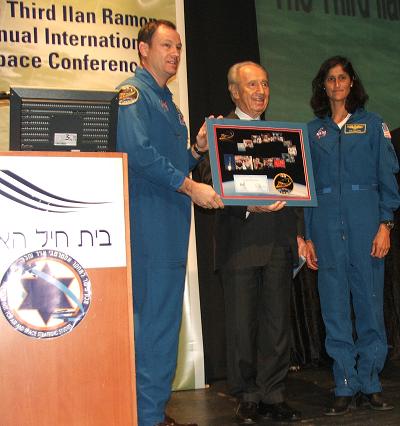This is what the commander of the Air Force, Major General Eliezer Shakdi, demands. Today, the systems are developed at MPAAT * President Peres spoke about the young generation for whom there are no limits, thanks to "Book Face" among other things * Astronaut Sunita Williams recommends: keep your physical fitness

The decentralization that exists today in the IDF between the military space program that is under MPAAT and the Air Force does not please the commander of the Air Force, Major General Eliezer Shakdi. General Shakdi spoke at the opening of the third annual Ilan Ramon International Space Conference, of the Fisher Institute and the Ministry of Science, which was held this morning at the Air Force Base in Herzliya.
"The mission of the Air Force is to operate in the air, to be integrated in the deterrence of war and the achievement of the goals of the war. The meaning is to move the treatment of space to the level where we treat the air, both in the building of the force and in the exercise of the force in the space just as it happens in the air medium. Closing this circle has a tremendous meaning. I believe that this is a matter of principle at the organizational level and at the perceptual level. It is not yet closed at the overall IDF level. Because it's impossible to exaggerate its importance, and I'm convinced that this is the direction in which Chahal will go."
According to him, the space mediator has a deep operational meaning already today. In my view, matter-of-factly, today there is almost no action that is taken in operational contexts that is not related to space, whether in the fields of intelligence, whether in everything related to planning and control, including communication with the forces and the execution and analysis of results. "We intend to reach a situation where we will have real-time intelligence from space."
President Shimon Peres, who spoke after him, mentioned the field of space as a motivational factor for the youth to explore and invent. "There is no second line in scientific progress. Those who are not in the second row are retarded. Whoever does not raise his country to another level is not doing his job faithfully."
High-tech is the future, something that has no past, and when you break away from the past, you also break away from the prejudices of the past, from the fears of the past, and when you break away from the past, you only have one time left, the future, the future cannot be dealt with without taking risks, and for that you also need brave people Like the astronauts and also smart people like the scientists. Hi-tech has cut us off from prejudices, borders have almost no value, you can't impose a tax on what they have in mind. Today the distances have disappeared. Today the youth has Facebook (originally it said "Book Face"), it has its own library, its own language, its own friends and prejudices are also disappearing. Hi-tech is the thing that to a very large extent omits racism, differences between blacks and whites and yellows, certainly between women and men. There is a large list of girls who want to enlist in the Air Force to become pilots. We are slowly seeing how racism is giving way and as we progress, the prejudices are disappearing."
Referring to the late Ilan Ramon, Peres, who signed with President Clinton the document that started the process of launching the Israeli astronaut, said: "Israel without Ilan was a different country than with Ilan. He became a role model, a dream model for so many young people. In the Air Force there are restless people who are looking for the next spaceship, the new topic, that amazing curiosity that takes us out of the desert into which we were born and in which we walked slowly."
The second part of the day was dedicated to a joint lecture by astronauts Sunita Williams and Michael Lopez Alegria, both of whom spent at least part of the time together in 2006 on the International Space Station and described life on the space station, and scientist Najin Cox from NASA's Jet Propulsion Laboratory who is responsible for the unmanned projects around Solar System. She focused in particular on the Mars All-terrain Vehicle project, in which she was involved from the beginning until a few months after the robots landed safely on Mars.
Williams participated in the Boston Marathon race while on the International Space Station, using the treadmill on the space station. In response to the question of the science website at the press conference held in the afternoon, Williams said that she did this to encourage the youth to maintain physical fitness, especially, this is important, for those who would like to choose to be astronauts in the future, and in general, health should not be taken for granted, and must be maintained.
The youth must be excited about the field of space - Report from the Knesset Science Committee meeting, with the participation of the NASA delegation
